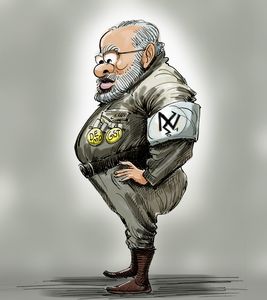The current stand-off between the Reserve Bank of India and the Narendra Modi government (personified by his Sancho Panza, Arun Jaitley) brings to mind a remark on “strong governments” by the former RBI governor, Raghuram Rajan: “Hitler took Germany efficiently and determinedly on the path to ruin.” That is what happens when statutory institutional independence and the balance of governance is trampled upon.
Although the parallel is far from being neat, Modi would do well to learn a few lessons from the experience of what happened when Hitler in 1937 stepped on the toes of Hjalmar Schacht, then president of the Reichsbank (former central bank of Germany). The analogy begins with the interesting fact that Urjit Patel had earned himself an international reputation as an economic wizard well before Modi appointed him RBI governor. Schacht, too, was regarded as an economic genius (his first term as Reichsbank president was from November 1923 to March 1930) well before he became an admirer of Hitler, who re-anointed him president of the Reichsbank within months of coming to power, in 1933.
In 1923, post-war Germany was hit by hyperinflation of an order never before experienced by any country. Schacht rescued stricken Germany by floating an alternative currency to the Reichsmark, called the Rentenmark—the equivalence between them being a trillion old marks for a single new mark. At a stroke, the currency was stabilised. He also floated the idea of MEFO bonds that enabled floundering industrialists to secure investible funds, when the reserves of large corporates like Krupp and Thyssen had dwindled to nothingness. Schacht thus engineered an economic miracle that recovered both old giants and small businesses, as also the start up of new ventures such as IG Farben.
But, he was neutralised when, in 1937, he started having serious disagreements with Hitler over excessive investment in the munitions industry, stoking unsustainable debt and rampant inflation. At about the same time, Hitler appointed Hermann Göring, his favourite Nazi thug, as minister for the four-year plan, and it was not long before Schacht and Göring found themselves in naked confrontation. This led to the ouster of Schacht from the Reichsbank in January 1939, and pushed Germany, as Rajan said, to “the path of ruin”.
It is the institutional damage to RBI’s independence that will have the most deleterious consequences for the economy and the polity if on November 19—when the RBI Board meets—Patel and his board members succumb to the threats and blandishments of Modi & Co. It is the latter who have dragged our economy to the brink by measures like demonetisation and the disruptive implementation of GST. Patel, exercising his unique statutory responsibility for monetary policy and financial stability, has been like Horatius on the Tiber bridge resisting the profligacy and cupidity of the government that has brought on a crisis in both the fiscal deficit and the current account deficit. To save their fast-diminishing credibility and political fortunes, Modi-Jaitley are demanding a humongous transfer of RBI’s hard-built reserves to government account, and the subordination of independent RBI decision-making to the whims and fancies of partisan considerations in an election year.
In the coming battle in the RBI board room, it is to be seen whether the Indian Schacht prevails over the Indian Göring, or, as in 1939, Göring wins out and plunges the nation into disaster.
Aiyar is a former Union minister and social commentator.


